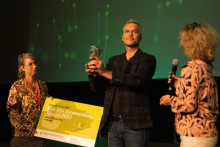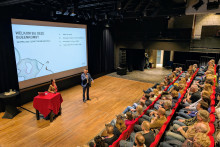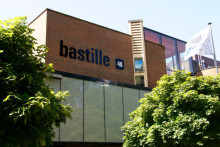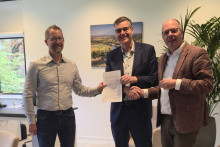Wissink graduated from UT in electrical engineering in 1997. Afterwards, he was involved in founding several companies, including Medspray and Nanomi. Since 2017, he is director of U-Needle, which designs and manufactures intradermal needles.
Wissink received the Van den Kroonenberg Prize for young entrepreneurship. The prize is named after former rector Harry van den Kroonenberg, the founder of the UT as an 'entrepreneurial university'. The entrepreneurial award, presented by the UFonds, consists of a cash prize of 4,500 euros, a certificate and a statue made by Van den Kroonenberg's daughter Mohana.
Did you see this award coming?
'Not at all, in fact. I was pleasantly surprised. Ten or fifteen years ago, after we founded Medspray and that company grew significantly, I expected the award more. Back then people in my surroundings won the prize and I was already interviewed as a nominee. That I, as a fifty-year-old, am now winning a prize for young entrepreneurs is very nice. U-Needle has been around since 2008, but as a company we are still young. You need in the medical-nanotechnology industry about fifteen to twenty years to actually deliver products in large numbers to customers.'
ut-challenge
The finals of the sixth edition of the UT Challenge also took place. Five months ago, 91 different projects entered the entrepreneurship competition for students. From the twenty candidates who made it to the finals, these were the winners:
In the Ideation category (3000 euros): ExoMembra
In the Prototyping category (4000 euros): SonoMag
In the Startup category (5000 euros): Smart Road Marking Inspection
The Audience Award (1500 euros): MakeDnD
The 'ASML Makers Award': Managescape
Creative Mules Branding Packages: Homemade; SAVR
Dutch 4TU Impact: Managescape; SAVR
Shell Energy Transition: Ignite
Are you happy with the award?
'I think it's a wonderful gesture. My wife called it a lifetime achievement award, and by that she is referring to the coincidence that I can still win the award at my age. Without a doubt, I find it honorable. In 1997 I graduated from the UT. I remember that Harry van den Kroonenberg had just passed away. We felt strongly the atmosphere of an entrepreneurial university in those years and that appealed to me enormously. The desire to do something useful with the knowledge you were offered really lived on campus then. I don't want to take anything away from current times, but it sometimes seems now to be more about graduating quickly and then making money. In my opinion, entrepreneurship is not so much about making money, but about developing something that suits you and by that, doing something useful for society. In my case that was designing products in a new technology: in silicon. From the very first idea to mass production.'
In those years, did you expect to be working as an entrepreneur on campus 25 years later?
'Not at all. As a boy from Denekamp I wanted to travel all over the world. I saw a lot of the world, but didn't get past than Enschede. I didn't like my study of electrical engineering until it was about etching of silicon. Then the penny dropped for me. I owe that mainly to Professor Miko Elwenspoek, who could talk about silicon with passion. When I graduated, the recruiters were literally standing in the hallway, holding the key to a lease car. Every electrical engineer who graduated back then could immediately start working in ICT, but I didn't want that. Nor did I want a PhD. I wanted to design useful products with the new nanotechnology and I wanted to do that in my own way.'
And that had to be done with silicon?
'In retrospect, it's only now that everything falls into place, but I didn't know that at the time. First I worked at 3T for five years and then I successively founded Medspray, Nanomi and U-Needle. Different companies that I was allowed to start with different people, but all from the NanoLab, with silicon, or the semiconductor industry, as the basis. I still find it special that now - after thirty years - I can work in exact same place, in the same building where I graduated.'
You have never been employed by UT. Is it a conscious decision to work on campus anyway?
'No, that also happened by chance. When I started in business in 2001, the NanoLab was still here at De Veldmaat and was part of the ELTN building. When the NanoLab moved to its current location in 2011, the question was what to do with the old MESA Lab. In consultation between MESA+ and the NanoLab entrepreneurs from the very beginning, the High Tech Factory (HTF) was born. We were then given the opportunity from the UT to develop our own production in HTF. In hindsight, a great choice, but not without blood, sweat and tears from both the UT and the entrepreneurs. By now all that has been modernized and we produce millions of products a year in HTF, something to be proud of as a UT community.'
What does U-Needle do?
'We make silicon micro-needles that are specifically designed to inject intradermally, that is, into the skin. You can tell because you get a bleb on the skin. That is a kind of blister, which indicates that the fluid has entered the upper layer of the skin. The big advantage of this is that the fluid comes into contact with the immune system right away. That doesn't happen when you inject into the muscle. That means much less vaccine is needed, a factor of five to ten less in fact. We sell the needles to international customers and are now scaling up to five million needles a year. Ultimately, we want to scale up to a hundred million needles within a few years. That sounds like a gigantic production run - which it is - but an annual production of one hundred million silicon micro-needles will still fit on a desk.'
What will you do with the prize?
'First we're going to celebrate tonight with all fifteen employees, family and friends and have a nice dinner out. After that, we'll see.'
Finally. As an award winner, what would you like to pass on to young start-up entrepreneurs?
'Only do something you really enjoy, otherwise you will give up at some point. Because turning a business into a success is about perseverance and always takes longer than you think and with more setbacks than you expect. Which is good, otherwise you probably won't even start. Ask successful entrepreneurs and they will tell you every success requires nine failures. Search well and find something that suits you. If someone wakes me up at night with a question about etching in silicon, I'm still happy to help them. It has become a passion. Exactly as Miko Elwenspoek lectured in 1995. I felt that spark back then.'






